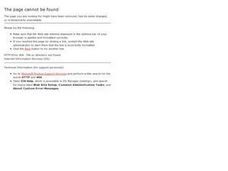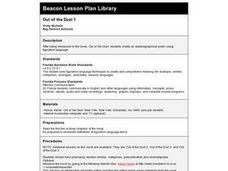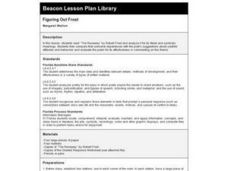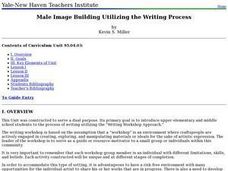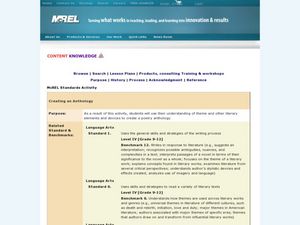Curated OER
T'was the Night Before Christmas (Poem)
Students read the poem T'was the Night Before Christmas, and then partner with another student to complete a poem of their own based on the original. The new poem has missing words and students fill in the missing parts of speech like a...
Curated OER
Bio-Poems and U.S. History
Students explore U.S. History by writing poems. For this United States leader biography lesson, students identify elements needed to create a good poem, and write a Bio-Poem about themselves. Students utilize the same form to write a...
Curated OER
Where's Walden and Why Henry?
Sixth graders understand how Thoreau can serve as both inspiration and model for the investigation of home places. They explore ways to become better observers of natural and cultural history. Students find out how to connect with their...
Curated OER
Discovering Ourselves in Literature and Life
Students read literature and view other media to discover how print and non-print texts answer the thematic question: Who am I? students compare the ways ideas are presented, and create their own portfolios or personal Web pages...
Curated OER
Jabberwocky-Identifying Adjectives
Elementary learners identify adjectives in sentences. They read the poem "Jabberwocky" by Lewis Carroll and highlight the adjectives. A good supplemental lesson if you are studying Lewis Carroll and/or "Jabberwocky."
Curated OER
Guided Reading with Jazz Baby
Jazz music and musicians are the focus of this language arts lesson. Young readers independently read the book Jazz Baby. To build fluency and independence they read silently, but are guided by directive comments from the teacher. They...
Curated OER
A Simile and Metaphor Lesson
Pupils use their knowledge of similes and metaphors to analyze poetry. For this poetry and language lesson, students read examples of similes and metaphors and write their own examples that describe their city, television, or an era in...
Curated OER
Poetic Devices
In this figurative language worksheet, students read and study examples of simile and metaphor. There are 20 questions to be used with Smartboard and 10 questions in which students identify similes or metaphors.
Curated OER
Out of the Dust 1
Pupils review figurative languages terms and examples. They read the first entry in the book, Out of the Dust, and discuss the images created by the author. Then they create an autobiographical poem using figurative language.
Curated OER
Come On, Rain!
Students read and analyze the story. In this language arts lesson plan, students read Come on, Rain! and examine how mood and tone are created, the use of figurative language and the characteristics of the genre. Students research the...
Curated OER
Alliterations Allowed
Fourth graders recognize and create alliterative language in both literary and commercial use. In this language arts lesson, 4th graders analyze pieces of poetry and focus on the use of imagery, personification, and figures of speech.
Curated OER
The Unraveling of a Poem
High schoolers study poetry and poets from different countries and time periods. They analyze various poems, present a dramatic reading of a poem and teach a poem they like to their class.
Curated OER
Figuring Out Frost
Fourth graders read "The Runaway" by Robert Frost and analyze it for its literal and symbolic meanings. They compare their personal experiences with the poet's suggestions about youthful attitudes and behaviors. Some nice worksheets are...
Curated OER
Comparatively Speaking
Students practice creating similes and metaphors together as a class. Individually students create similes and metaphors and illustrate them.
Curated OER
Paper Cranes
Paper folding is a great art form that can be incorporated into cultural, mathematic, and art lessons. This resource includes the full instructions needed to fold a paper crane, as well as a Haiku poetry idea. Tip: This activity would be...
Curated OER
Preparing Students to Read the Aeneid
Teaching the Aeneid this year? Read this quick article to develop some plans and strategies for teaching the epic poem to your advanced learners.
Curated OER
The Stranger Redeemed: A Portrait of a Black Poet
Read and analyze poems by African-American authors. Using the text, they identify the various patterns, subjects, language and dialects used. Then team up to compare and contrast the various authors and define new vocabulary. The lesson...
Curated OER
Johnny Appleseed
Students engage in a study of apples using children's literature. They conduct research using a variety of resources. Student list facts about apples and compare them while answering some guided questions. They plant some apple seeds and...
Curated OER
Applying SQ3R to Texts
After a review of the SQ3R strategy, readers use the provided prompts to respond to a text. The value of this worksheet is in the additional questions that move the learner into higher levels of reasoning.
Curated OER
Male Image Building Utilizing the Writing Process
Introduce your class to the techniques of proper writing. In groups, they brainstorm their ideas on family structures and discuss the importance of having a male figure in their lives. After listening to an African-American poem, they...
Curated OER
Creating an Anthology
Student compile a poetry anthology. In this literature lesson, students examine notable poetry anthologies. Students then select a theme to build their anthologies of 10 poems pertaining to their chosen theme.
Curated OER
Screening Coleridge’s Fantasies: Using Popular Music as a Bridge to Literacy
Twelfth graders use music to aid them in interpreting poetry. In this poetry lesson, 12th graders analyze the lyrics, figurative language, and literary devices of selected music. Students compare the music to the poetry of Samuel...
Curated OER
Using Rock to Teach Literary Devices: Jimi Hendrix “The Wind Cries Mary”
Students explore literary elements through music. In this figurative language lesson, students examine imagery and personification in "The Wind Cries Mary" by Jimi Hendrix.
Curated OER
Practicing Literary Analysis
Ninth graders analyze the poem, "The Rime of the Ancient Mariner." They read, discuss, and critique the poem in small groups focusing on plot and figurative language. They compose a short essay explaining how various literary elements...




